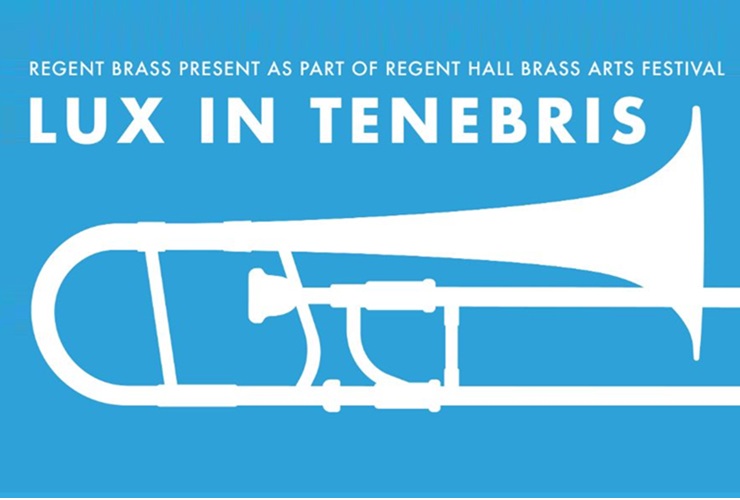
Regent Brass
Conductor: Alan Duguid
Soloist: Brett Baker
Pupils of Haberdashers’ Boys School
Regent Hall, London
Friday 17th October

Regent Brass’s latest concert of (mostly) original music for brass band, part of Regent Hall’s Brass Arts Festival, marked two anniversaries – those of Samuel Coleridge-Taylor’s birth 150 years ago, and of Arthur Bliss’s more recent death in 1975. Also running through the programme was the theme of ‘lux in tenebris’ (light in the darkness), illustrated in various forms.
Top and tail
The works of the two anniversarians topped and tailed the concert. Coleridge-Taylor’s short ‘Military March from Othello’ opened the proceedings, its style easily recognisable to those familiar with early 20th century brass band repertoire, while ‘Four Dances from Checkmate’, Eric Ball’s transcription of Bliss’s ballet music, closed the evening. However, it was the two works which fell on either side of the interval which, shone out as the brightest lights in a wonderful evening of music.
‘Jesus’ Blood Never Failed Me Yet’ (Gavin Bryars), like many minimalist works, has a hypnotic quality, rather like Michael Nyman’s ‘In C Interlude’ which Regent Brass played in concert last year.
None of these pieces, however, match Bryars’ work for sheer heart-rending emotion.
The art of combining the human voice with brass instruments has been demonstrated, perhaps most convincingly, by Jacob ter Veldhuis (Jacob TV) in works such as ‘Syracuse Blues’, ‘Pitch Black’ and ‘I Was Like Wow!’. None of these pieces, however, match Bryars’ work for sheer heart-rending emotion. The fragile voice of a homeless old man on the streets of London singing a half-remembered hymn is looped continuously, while the band, augmented by guitar, bass guitar, accordion and piano, creates an arc of ever-changing textures to accompany him.
The work begins and ends in silence. The effect is truly pitiful: a wretched soul clinging desperately to the hope of salvation, the emotion becoming more intense with every repetition. Light in the darkness, indeed.
Joyous fusion
In stark contrast, ‘Gold Saturday’ (Errollyn Wallen) was a joyous fusion of Indian bhangra and British brass band styles, led by pupils of Haberdashers’ Boys School in an ensemble of trumpets, trombones, sousaphone, soprano saxophone, dhol and snare drums. These young boys exhibited a musical maturity beyond their years, with a percussion section continually urging each other on, an assured saxophone soloist and a trombone player barely taller than his instrument!
This was apparently only the second performance of the work since it was written in 2004, the same year as another ‘fusion’ work, Philip Harper’s ‘The Legend of Sangeet’ for sitar and brass band, appeared. Both works deserve greater exposure.
Great form
Soloist Brett Baker was on great form in his four contributions to the programme. The most substantial of these, Ray Steadman-Allen’s ‘Immortal Theme’, not the easiest work to assimilate on first hearing, was given an authoritative reading, while ‘His Provision’ (Ivor Bosanko arr. Dorothy Gates) and ‘Cloud Rider’ (Dan Price) provided relaxed and energetic offerings respectively.
Perhaps the best was Baker’s capricious take on ‘Atlantic Zephyrs’ (Gardell Simons), one of those bandstand crowd-pleasers from the USA
Perhaps the best was Baker’s capricious take on ‘Atlantic Zephyrs’ (Gardell Simons), one of those bandstand crowd-pleasers from the USA, in which tempi and rubato were stretched to their limits – as was the band’s ability to stay with the soloist, which they did very well. Throughout, the balance between the two parties was well calibrated, the trombone sound always cutting through.
Tribute
The programme was completed with two colourful works which reflected the evening’s theme. ‘Into the Darkness They Go, the Wise and the Lovely’, Kelly-Marie Murphy’s tribute to Bram Tovey, first heard at the RNCM festival in 2023, and ‘Strange Light’, written by the band’s principal cornet Peter Yarde-Martin, inspired by “an experience of the Northern Lights over Reykjavik on a cold November night”.
With the final item, Bliss’s ‘Checkmate’ dances, evidence of fatigue and a dip in concentration levels was making itself known. But by then, a huge amount of great work had been done. Even then, the band felt able to give us a short encore, a miniature by Coleridge-Taylor called ‘Summer is Gone’.
Gratifying
It was gratifying to see a good-sized audience turn out for this concert. The fact that there was no admission fee was another pleasant bonus, although donations were of course encouraged and given.
As I have remarked before, there is most definitely an audience for good quality original music for brass band - music which does not match the standard fare. Regent Brass under Alan Duguid have recognised this and are proving the point.
The sort of programmes they are putting together would not be out of place at the RNCM International Brass Band Festival in Manchester. Surely, an invitation to that event cannot be long in coming?
Alec Gallagher









